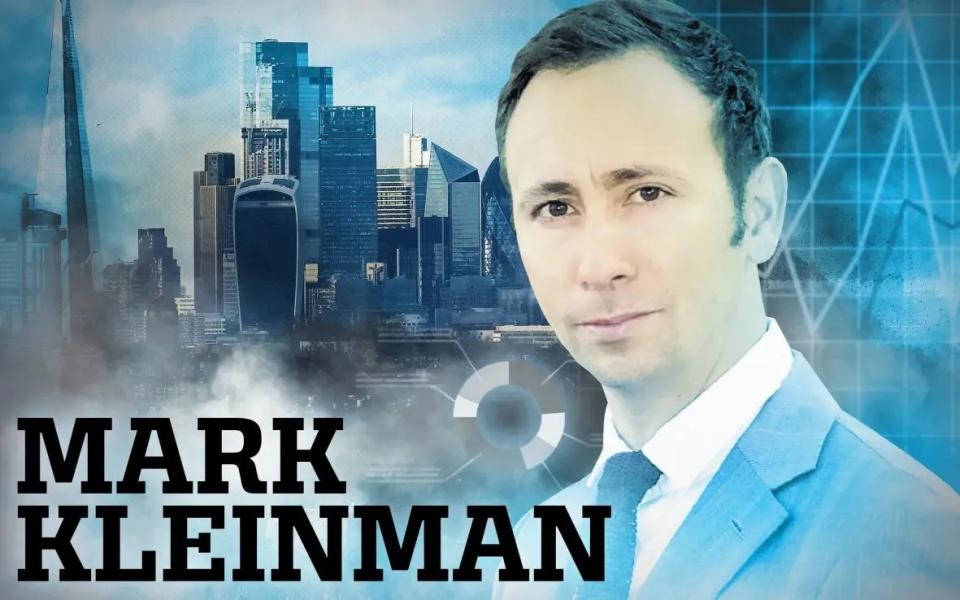Mark Kleinman: Thames Water crisis drains confidence in privatised sector

Mark Kleinman is Sky News’ City Editor and is the man who gets the City talking in his weekly City A.M. column. This week he tackles the Thames Water chaos; DS Smith investors; and Nationwide’s advertising campaign.
Thames Water crisis drains confidence in privatised sector
Balance sheet drainage, leaking investor confidence, a rescue in the pipes: few industries lend themselves to the punning instincts of financial journalists like water. Thames Water should get used to it – the battle over its future will last for months.
The company’s prospects already looked bleak before its shareholders announced last week that they were baulking at a £500m equity injection promised by the end of March. The – not illogical – view of investors including the Universities Superannuation Scheme and Omers, a Canadian pension fund, is that proceeding with it would be throwing good money down the, er, drain.
Chris Weston, the Thames Water chief executive, struck an unexpectedly positive tone when suggested that a compromise with Ofwat could be within reach by either the time of its draft or final regulatory determinations in June and December respectively.
Weston is right that Thames’s services are not in danger – it is sitting on more than £2bn in cash and he may benefit from the fact that Rishi Sunak’s government needs a vastly complex corporate insolvency relating to an essential public service about as much as it needs another cronyism controversy.
Aside from the unpalatable prospect of applying pressure on Ofwat to cave in, which would set an appalling precedent for the principle of supposedly independent economic regulation, there seems little alternative.
Already, the gurgling from the pipes of Whitehall’s machinery implies that an accommodation may be possible on consumer bills, but the idea that Ofwat and the Environment Agency should be expected to go easy on Thames when they apply fines for regulatory breaches is outrageous.
Weston is right that the company’s problems pre-date his arrival – public attacks from ministers such as Michael Gove, the levelling-up secretary, that Thames’s management has acted “disgracefully” are deeply unhelpful. Gove might want to remember the recent storm between his cabinet colleague Kemi Badenoch and Henry Staunton, the Post Office chair she sacked, before he puts Weston in a position where he feels that condemnation for a situation he did not create mean it’s all too much trouble.
The last thing Thames Water needs at the moment is to be rudderless and left without a competent CEO. That really would mean Britain’s biggest water supplier is up the proverbial without a paddle.
DS Smith investors have windfall wrapped up
Paper and packaging companies aren’t supposed to be this exciting. An unfolding bidding battle for DS Smith, the FTSE-100 industrial group, is the least surprising M&A situation to emerge this year.
Rival London-listed Mondi’s approach, pitched at 373p-a-share (although the price varies depending upon the value of its stock), always looked to have left the door open to a competing bidder.
Not wanting to be left orphaned by industry peers getting together looks to have spurred the approach from International Paper of the US, which I revealed on Sky News last week.
That too, is an all-paper deal but the decline in International Paper’s share price since its interest was made public means it’s now worth scarcely more than Mondi’s.
People close to the process say that both bidders would face serious competition scrutiny, even allowing for the fact that there is comparatively little geographical overlap between International Paper and DS Smith.
For shareholders in DS Smith, the appetising prospect of an ongoing bidding war solves a couple of key problems: firstly, how to replace Miles Roberts, the company’s veteran chief executive, who had already signalled his intention to retire (which itself was interpreted by many as an invitation to would-be suitors).
Secondly, it has injected ballast into a flagging stock price, while also providing DS Smith with the safety of a larger global entity that should insulate it from any future unsolicited bid.
Absent the appearance of a third bidder, investors should expect these two to slug it out for a while before one of them delivers a knockout blow. DS Smith’s future should be, er, neatly wrapped up well before fund managers disappear for their summer holidays.
Rap on Nationwide’s knuckles risks mutual antipathy with members
The verdict is damning. Nationwide’s contentious advertising campaign, featuring Dominic West as a bank manager gripped by avarice and contempt, has been banned by advertising watchdogs for misleading customers about its approach to closing branches.
So let’s get this straight: a mutually owned financial services group, which ripped into high street banks for their rapacious self-interest, has itself been rapped on the knuckles for failing to be straight with the people who own it (Nationwide’s “intended target audience for the ad had been their existing current and savings account holders”, according to the Advertising Standards Authority).
Brand campaigns like this aren’t always signed off by their creators’ C-suites, but there’s no doubt in my mind that Debbie Crosbie, Nationwide’s chief executive, will have had her hand firmly on the pen behind this one, since it goes to the heart of her apparent vision for the group.
The trouble is that Nationwide’s explanation for failing to give its members a vote on its £3bn takeover of Virgin Money sounds like sophistry, and risks – along with the ASA ban – engendering mistrust among its most important stakeholders. Proud to be different? The leadership of Britain’s biggest building society should be careful what they wish for.

 Yahoo Finance
Yahoo Finance 